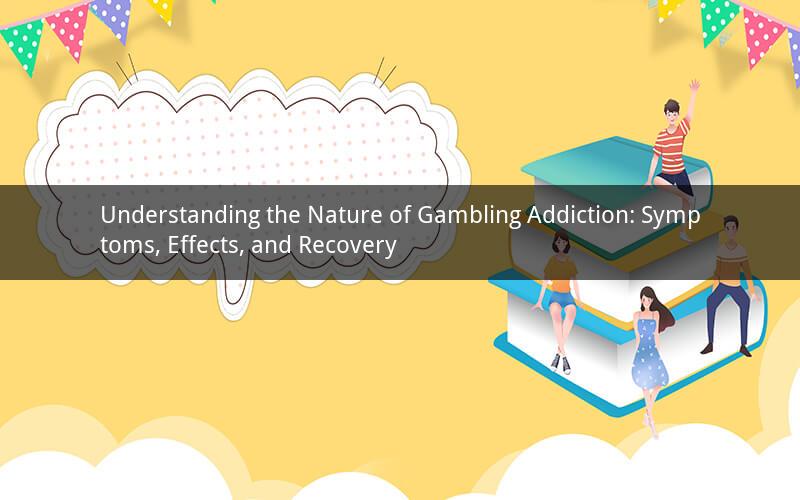
Gambling addiction, also known as pathological gambling, is a complex condition that affects millions of people worldwide. It is characterized by an uncontrollable urge to gamble, despite the negative consequences that it may have on one's life. In this article, we will delve into the nature of gambling addiction, its symptoms, effects, and recovery methods.
Symptoms of Gambling Addiction
1. Preoccupation with gambling: Individuals with gambling addiction often find themselves thinking about gambling even when they are not actively engaged in it. They may constantly plan their next gambling session, strategize ways to win, or replay past gambling experiences.
2. Inability to control gambling behavior: Despite the desire to stop, individuals with gambling addiction find it challenging to control their gambling behavior. They may continue to gamble even when they are in financial trouble, or when it causes stress and conflict in their relationships.
3. Escalating gambling: As individuals become more addicted, they may start to gamble with higher stakes or for longer periods of time. This escalation is driven by the hope of winning back lost money or achieving a higher level of excitement.
4. Lying and deceit: To hide their addiction, individuals with gambling addiction may lie to family, friends, or even employers about their gambling activities. They may also steal or sell personal belongings to finance their gambling habits.
5. Emotional and psychological distress: As gambling addiction progresses, individuals may experience a range of emotional and psychological symptoms, such as anxiety, depression, and mood swings. These symptoms can further exacerbate their gambling behavior.
Effects of Gambling Addiction
1. Financial consequences: Gambling addiction can lead to significant financial problems, including bankruptcy, debt, and loss of savings. Individuals may find themselves in debt to friends, family, or even organized crime syndicates.
2. Relationship problems: The stress and financial burden of gambling addiction can strain relationships with family and friends. Individuals with gambling addiction may become distant, irritable, or secretive, leading to increased conflict and separation.
3. Legal issues: In some cases, gambling addiction may lead to legal problems, such as fraud, theft, or embezzlement. Individuals may steal money to finance their gambling habits, or commit other illegal activities to support their addiction.
4. Health problems: The stress and anxiety associated with gambling addiction can lead to a range of health problems, such as heart disease, high blood pressure, and other mental health disorders.
5. Suicidal thoughts: In severe cases, gambling addiction may lead to suicidal thoughts or actions. The emotional and psychological distress caused by the addiction can make individuals feel overwhelmed and desperate.
Recovery from Gambling Addiction
1. Seeking help: The first step in overcoming gambling addiction is to acknowledge the problem and seek help. This can involve consulting with a therapist, joining a support group, or attending a rehabilitation program.
2. Setting goals: Individuals with gambling addiction should set clear, achievable goals for their recovery. These goals may include reducing the frequency of gambling, limiting the amount of money spent on gambling, or ceasing gambling altogether.
3. Building a support system: A strong support system is crucial for overcoming gambling addiction. This can include family, friends, therapists, and support groups. These individuals can provide encouragement, accountability, and guidance throughout the recovery process.
4. Developing coping skills: Individuals with gambling addiction should learn and practice healthy coping skills to manage stress and anxiety. These skills may include exercise, meditation, and other stress-reduction techniques.
5. Continuing treatment: Recovery from gambling addiction is a lifelong process. Individuals should continue to seek treatment and support even after they have achieved their initial goals. This can help prevent relapse and promote long-term recovery.
Frequently Asked Questions
1. What causes gambling addiction?
Gambling addiction can be caused by a combination of genetic, environmental, and psychological factors. Some individuals may be more susceptible to addiction due to their genetic makeup, while others may develop addiction due to environmental factors such as exposure to gambling at a young age.
2. How can I tell if someone has a gambling addiction?
Signs of gambling addiction may include preoccupation with gambling, inability to control gambling behavior, lying about gambling activities, and experiencing negative consequences as a result of gambling.
3. Is there a cure for gambling addiction?
While there is no cure for gambling addiction, recovery is possible with the right treatment and support. Many individuals have overcome their addiction and gone on to lead fulfilling lives.
4. Can gambling addiction be treated?
Yes, gambling addiction can be treated through various methods, including therapy, support groups, and rehabilitation programs. The most effective treatment plan will depend on the individual's specific needs and circumstances.
5. How can I help someone with a gambling addiction?
The best way to help someone with a gambling addiction is to offer support and encouragement. This may involve listening to their concerns, helping them seek treatment, and holding them accountable for their actions. It is important to approach the situation with empathy and understanding, as gambling addiction is a complex and challenging condition.